Russian space program in 2021
On February 20, Head of Roskosmos Dmitry Rogozin paid a visit to the Kremlin for a report to the president on the year-end status of the Russian space sector. In a public transcript of his exchange with Vladimir Putin, Rogozin said that 29 space launches had been planned for 2021, including missions postponed from the previous year, referring primarily to the OneWeb Internet satellites, but also to the long-delayed launch of the Luna-25 lander and the Obzor-R radar-carrying satellite. Two modules for the Russian Segment of the International Space Station, ISS, (Nauka and Prichal) were also promised to fly. Finally, one Angara-5 and two Angara-1.2 launchers were scheduled to continue flight testing of the new rocket family. According to Rogozin, the Russian civilian satellite constellation included 89 spacecraft at the time. In the meantime, as of August 2021, the Russian Strategic Missile Forces, RVSN, promised to deploy 15 new ICBMs before the end of the year and test several new strategic missile systems.
For missions in 2020 click here
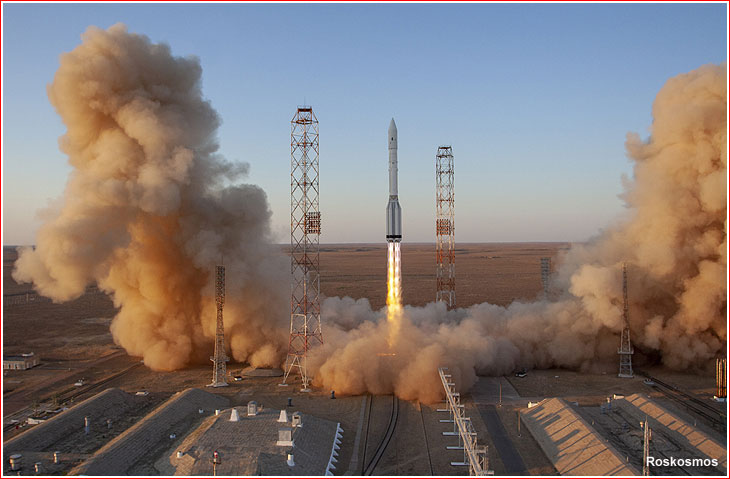
A Proton rocket with the MLM-U Nauka module lifts off on July 21, 2021.
In reality, by the end of the year, Russia conducted 25 orbital launch attempts, which was a healthy increase from 17 missions in 2020, even though it was primarily thanks to a controversial contract with the OneWeb company. Oneweb was one of three major international customers still relying on Russian rockets in 2021, not counting unofficial reports about potential deals (INSIDER CONTENT) for future commercial launches on a Proton rocket. OneWeb satellites accounted for 284 spacecraft out of 340 which Roskosmos launched in 2021. Another 38 satellites, including two European Galileo satellites and a South-Korean Earth-watching satellite were launched under international commercial contracts and the rest were light-weight piggy-back payloads. A total of 18 Russian-built spacecraft were launched in 2021, including eight for the International Space Station, ISS, (among them, the long-awaited Nauka and Prichal modules), while four missions delivered military payloads and three carried civilian application satellites. Three small educational satellites built in Russia were also launched. No Russian deep-space or dedicated scientific missions left the ground during the year.
Based on recent launch statistics, there was clear evidence of improved quality control in the Russian launch vehicle fleet, even though the overall record in 2021 wasn't flawless and was accompanied by a continuous trend to curb transparency and free exchange of information between the industry and the outside world.
By all available accounts, one Russian military observation satellite entered orbit without signs of life, but whether it was damaged at launch or suffered an internal fatal problem was impossible to tell due to secrecy. Also, a Proton rocket delivered two Ekspress communications satellites into an out-of-specifications orbit due to misfiring of the Briz-M's upper stage, which, fortunately, did not result in the loss of payloads, but Roskosmos never publicly admitted, let alone explained the issue. Finally, the third test mission (INSIDER CONTENT) of the Angara-5 rocket on December 27 resulted in a failure of the Block DM-03/Persei upper stage, following a seemingly good performance of the rocket's lower stages.
The Ministry of Defense and Roskosmos publicized the Angara's liftoff with North-Korean-style fanfares in the state-controlled media, promising that the latest mission would help the new rocket family enter the international market and "...give the Russian defense ministry a capability to deliver satellites of any mass to any distance from Earth, making Russia the only space power capable of launching objects with the mass of 20, 25 and even 30 tons to a distance of more than 40,000 kilometers from Earth..." The same media, as well as official channels, then remained silent for days about the results of the launch that had left the upper stage and its simulated cargo on a path to an uncontrolled reentry. As of December 30, Russian authorities had made no statements on the status of the stranded Persei space tug.
In a subsequent summary of activities for the year, Roskosmos resorted to the use of clever language in an attempt to gas-light the public and to skew overall launch statistics. The state corporation claimed 25 successful "pusks" during the year and 76 accident-free "starts" in a row. Using such terms, which technically mean "liftoff" rather than "launch," Roskosmos apparently tried to limit the technical definition of a success essentially to the rocket's clearing the launch pad or entering an initial orbit, without regard for the fate of its cargo or its destination. Ironically, in the same report, Roskosmos went on to contrast its "record" with launch failures in other countries, particularly, in China and in the United States, even though these space powers consistently doubled Russian launch rates in recent years, launched far more domestically built satellites on missions that Roskosmos could not even dream of, while their failures were mostly associated with the introduction of new-generation launch systems by a new crop of privately funded industrial players, the likes of which were barely on the horizon in Russia.
In the meantime, even a passing scan of headlines in increasingly self-censored Russian media still revealed that the nation's space program and the overall high-tech industry in the country continued struggling with brain drain, corruption, low efficiency and international isolation, while the effort to modernize the production and testing infrastructure and increase self-reliance of the Russian space sector was ongoing...
The world's orbital launch attempts in 2021 (as of
January 20, 2024
):
| 1 |
USA |
Jan. 7 |
9:15 p.m. EST |
Turksat-5A |
Application / communications |
Falcon-9 (104, B1060.4) |
Cape Canaveral |
SLC-40 |
- |
Success |
| 2 |
USA |
Jan. 17 |
10:38 a.m. PST |
10 ELaNa CubeSats: CACTUS-1, ExoCube-12, MiTEE, CoSGC, PolarCube, Cu-PACE, TechEdSat-7, CAPE-3, RadExSat-2, PICS-1, -2 |
Experimental |
LauncherOne Rocket 3/Boeing-747 Cosmic Girl |
Mojave |
- |
- |
Success |
| 3 |
China |
Jan. 20 |
00:25 Beijing Time |
Tiangong-1-03 |
Application / communications |
Chang Zheng-3/G2 |
Xichang |
2 |
- |
Success |
| 4 |
USA |
Jan. 20 |
07:26 UTC |
GMS-T |
- |
Electron |
Mahia |
LC1 |
- |
Success |
| 5 |
USA |
Jan. 20 |
8:02 a.m. EST |
Starlink Flight 17 (956-1,014) (60) |
Application / communications |
Falcon-9-105 (B1051.8 S) |
Cape Canaveral (KSC) |
39A |
A |
Success |
| 6 |
USA |
Jan. 24 |
10:00 a.m. EST |
Transporter-1: Starlink (x10), ASELSAT, Capella-3 (Whitney-1), Capella-4 (Whitney-2), Charlie, PIXL-1 (CubeL, OSIRIS4Cubesat), Flock-4s (x40), GHGSat-C2 (Hugo), ICEYE-X8, -X9, -X10, IDEASSat, ION-SVC 2 (ION-SVC Laurentius, PULSE) [Flock-4s (x8), SpaceBEE (x12)], Kepler (x8), Landmapper-Demo-6, -7, Lemur-2 (x8), Prometheus-2.10 (P2-10), ELaNa-35: PTD-1, QPS-SAR-2 Izanami (IQPS-2), ADELIS-SAMSON-1, -2, -3, SOMP-2b, SpaceBEE (x24), SXRS-3 / Sherpa-FX 1 [ARCE-1A, ARCE-1B, ARCE-1C, Astrocast (x5), Hawk-2A, -2B, -2C, hosted payloads: Celestis-17, ELROI, EyeStar-Tag], UVSQ-SAT, V-R3X (x3), XR-1, YUSAT |
Application |
Falcon-9 (106-B1063.2S) |
Cape Canaveral |
SLC-40 |
- |
Success |
| 7 |
China |
Jan. 29 |
12:47 Beijing Time |
Yaogan Weixing-31 Group-2 |
Military |
Chang Zheng-4C (Y31) |
Jiuquan |
43/94 |
- |
Success |
| 8 |
China |
Feb. 1 |
16:15 Beijing Time |
Fangzhou-2 |
Experimental |
Shuang Quxian-1 (Y2) |
Jiuquan |
43/95 |
- |
Failure |
| 9 |
Russia |
Feb. 2 |
23:45:28.079 Moscow Time |
|
|
|
|
|
4 |
Success |
| 10 |
USA |
Feb. 4 |
1:19 a.m. EST |
Starlink Flight 18 (60 sats: 1,014-1,074) |
Application / communications |
Falcon-9-107 v1.2 (Block 5) |
Cape Canaveral |
LC-40 |
- |
Success |
11 |
China |
Feb. 4 |
23:36:04.286 Beijing Time |
TJSW-6 |
Military |
Chang Zheng-3B/G3 Y77 |
Xichang |
3 |
- |
Success |
| 12 |
Russia |
Feb. 15 |
07:45:06.310 Moscow Time |
|
Piloted / cargo supply |
|
|
|
6 |
Success |
| 13 |
USA |
Feb. 15 |
10:59 p.m. EST |
Starlink Flight 19 (60 satellites) |
Application / communications |
Falcon-9 v1.2 Block 5, Flight 108 (B1059.6 S) |
Cape Canaveral |
LC-40 |
- |
Success |
| 14 |
USA |
Feb. 20 |
12:36:54.4 p.m. EST |
Cygnus NG-15 (CRS-15, S.S. Katherine Johnson), ThinSat 2 (x30), DhabiSat (MYSat-2), Gunsmoke-J-2 (Jacob's Ladder-2), IT-Spins, Classified U.S. government payload (x2) |
Piloted / cargo supply |
|
Wallops Isl. |
- |
- |
Success |
| 15 |
China |
Feb. 21 |
10:22 Beijing Time |
Yaogan Weixing-31 Group-3 (x3) |
Military |
Chang Zheng-4C |
Jiuquan |
- |
- |
Success |
| 16 |
India |
Feb. 28 |
10:24 a.m. India Standard Time |
Amazonia-1, SindhuNetra, SDSat, NanoConnect-2, UNITYsat-1 - 3, SpaceBEE-76 - 87 |
Application / remote sensing |
PSLV-C51 |
Sriharikota |
- |
- |
Success |
| 17 |
Russia |
Feb. 28 |
09:55:01.415 Moscow Time |
|
|
|
|
|
6 |
Success |
| 18 |
USA |
March 4 |
03:24:54 a.m. EST |
Starlink Flight 20 (60 sats) |
Application / communications |
Falcon-9 (B1049.8) |
Cape Canaveral, KSC |
39A |
A |
Success |
| 19 |
USA |
March 11 |
03:13:29 a.m. EST |
Starlink Flight 21 (60 sats) |
Application / communications |
Falcon-9-110 (B1058.6 S) |
Cape Canaveral |
SLC-40 |
- |
Success |
| 20 |
China |
March 12 |
01:51 Beijing Time |
Shiyan-9 |
Experimental |
Chang Zheng-7A (Y2) |
Wenchang |
- |
- |
Success |
| 21 |
China |
March 13 |
10:19 Beijing Time |
Yaogan Weixing-31 Group-4 (x3) |
Military |
Chang Zheng-4C (Y42) |
Jiuquan |
43/94 |
- |
Success |
| 22 |
USA |
March 14 |
6:01 a.m. EDT |
Starlink Flight 22 (v1.0 L21) (60 sats) |
Application / communications |
Falcon-9 (111 - B1051.9 S) |
Cape Canaveral, KSC |
39A |
A |
Success |
| 23 |
Russia |
March 22 |
09:07:12.770 Moscow Time |
CAS-500-1, ELSA-d (2), GRUS (4), NAJM-1, DMSAT-1, Adelis-Samson-1 (3), Kepler (2), NanoSatC-BR-2, KMSL, Pumbaa, Timon, BeeSat (4), Hiber-3, Unisat-7, Unicorn-1, DIY-1, FEES, STECCO, SMOG-1, BCCSat-1, NII-VShE-DZZ, CubeSX-Sirius-HSE, Orbikraft-Zorky, SIMBA, GRBAlpha, Lacuna Space, Sateliot, Challenge One, KSU_CubeSat |
Application / remote sensing |
|
|
|
6 |
Success |
| 24 |
USA |
March 23 |
11:30 New Zealand Decree Time |
BlackSky-7, Centauri-3, Gunsmoke-J-1 (Jacob's Ladder-1), M2-A, M2-B, Myriota-7, Veery RL1-v0.1 |
Various |
Electron/Photon |
Mahia |
LC-1A |
A |
Success |
| 25 |
USA |
March 24 |
4:28 a.m. EDT |
Starlink Flight 23 (60 satellites) |
Application / communications |
Falcon-9 |
Cape Canaveral |
SLC-40 |
- |
Success |
| 26 |
Russia |
March 25 |
05:47:33.180 Moscow Time |
|
Application / communications |
|
|
|
- |
Success |
| 27 |
China |
March 31 |
06:45 Beijing Time |
Gaofen-12 02 |
Application / remote-sensing |
Chang Zheng-4C (Y43) |
Jiuquan |
- |
- |
Success |
| 28 |
USA |
April 7 |
12:34 p.m. EDT |
Starlink (60 satellites) |
Application / communications |
Falcon-9 |
Cape Canaveral |
SLC-40 |
- |
Success |
| 29 |
China |
April 9 |
07:01 Beijing Time |
Shiyan-6-3 |
Experimental |
Chang Zheng-4B (Y49) |
Taiyuan |
9 |
- |
Success |
| 30 |
Russia |
April 9 |
10:42:40.496 Moscow Time |
|
|
|
|
|
6 |
Success |
| 31 |
USA |
April 23 |
5:49 a.m. EDT |
Crew Dragon (Endeavour) |
Piloted |
Falcon-9 |
Cape Canaveral, KSC |
39A |
A |
Success |
| 32 |
Russia |
April 26 |
01:14:08.194 Moscow Time |
|
Application / communications |
|
|
|
- |
Success |
| 33 |
USA |
April 26 |
1:47 p.m. Pacific Time |
NROL-82 |
Military |
Delta-4 Heavy |
Vandenberg |
SLC-6 |
- |
Success |
| 34 |
China |
April 26 |
11:20 Beijing Time |
Qilu-1, Qilu-4, Foshan-1, Zhongan Guotong-1, Tianqi-09, Taijing-2-01, Jinzijing-1, Qiyuan taikong NEO-1 |
Application |
Chang Zheng-6 |
Taiyuan |
16 |
- |
Success |
| 35 |
Europe |
April 28 |
10:50 p.m. French Guiana Time |
Pleiades Neo-3, NorSat-3, Tyvak-182A (Eutelsat ELO alpha) |
Military / reconnaissance |
|
|
|
- |
Success |
| 36 |
China |
April 29 |
- |
Tianhe |
Unpiloted / space station module |
Chang Zheng-5B (Y2) |
Wenchang |
- |
- |
Success |
| 37 |
USA |
April 28 |
11:44 p.m. EDT |
Starlink (60 satellites) |
Application / communications |
Falcon-9 |
Cape Canaveral |
SLC-40 |
- |
Success |
| 38 |
China |
April 30 |
15:27 Beijing Time |
Yaogan-34 |
Application / remote-sensing |
Chang Zheng-4C |
Jiuquan |
- |
- |
Success |
| 39 |
USA |
May 4 |
2:01 p.m. EDT |
Starlink (No. 1,505-1,565) |
Application / communications |
Falcon-9FT Block 5 (F9-116) |
Cape Canaveral, KSC |
39A |
A |
Success |
| 40 |
China |
May 7 |
02:11 Beijing Time |
Yaogan-30 (Group 8: A, B, C), Tianqi-12 |
Application / remote-sensing |
Chang Zheng-2C |
Xichang |
3 |
- |
Success |
| 41 |
USA |
May 9 |
2:42 a.m. EDT |
Starlink (60 satellites) |
Application / communications |
Falcon-9 B1051 (10th flight) |
Cape Canaveral |
SLC-40 |
- |
Success |
| 42 |
USA |
May 15 |
22:11 New Zealand Time |
BlackSky Global (Group 20: 2 satellites) |
Application / remote-sensing |
Electron |
Mahia |
1 |
- |
Failure |
| 43 |
USA |
May 15 |
6:56 p.m. EDT |
Starlink (Flight 28: 52 satellites), Tyvak-0130, Capella-6 (Capella Whitney-4) |
Application / communications |
Falcon-9-118 (B1058.8S) |
Cape Canaveral, KSC |
LC-39A |
A |
Success |
| 44 |
USA |
May 18 |
1:37 p.m. EDT |
SBIRS Geo-5, TDO-3, TDO-4 |
Military / early warning |
Atlas-5 (421) |
Cape Canaveral |
SLC-41 |
- |
Success |
| 45 |
China |
May 19 |
04:03 UTC |
Haiyang-2D |
Application / remote-sensing |
Chang Zheng-4B (Y48) |
Jiuquan |
43/94 |
- |
Success |
| 46 |
USA |
May 26 |
2:59:35 p.m. EDT |
Starlink (60 satellites) |
Application / communications |
Falcon-9-119 (B1063.2) |
Cape Canaveral |
SLC-40 |
- |
Success |
| 47 |
Russia |
May 28 |
20:38:39.549 Moscow Time |
OneWeb-7 (36 satellites: 183-218) |
Application / communications |
Soyuz-2-1b/Fregat |
Vostochny |
1S |
- |
Success |
| 48 |
China |
May 29 |
- |
Tianzhou-2 |
Unpiloted / cargo supply |
Chang Zheng-7 (Y3) |
Wenchang |
201 |
- |
Success |
| 49 |
China |
June 2 |
- |
Fengyun-4B |
Application / weather forecasting |
Chang Zheng-3B |
Xichang |
- |
- |
Success |
| 50 |
USA |
June 3 |
1:29 p.m. EDT |
Cargo Dragon V2 SpX-22 (CRS-22) |
Unpiloted / cargo supply |
Falcon-9 (120) (B1067) |
Cape Canaveral, KSC |
39 |
- |
Success |
| 51 |
USA |
June 6 |
00:26 EDT |
Sirius-XM-8 |
Application / broadcasting |
Falcon-9 (121) (B1061.3 S) |
Cape Canaveral |
SLC-40 |
- |
Success |
| 52 |
China |
June 11 |
11:03 Bejing Time |
Beijing Xilie-3 dai xing, Haisi-2, Yangwang-1, Taikong Shiyan-1 'Tianjian Weixing' |
Science, Application |
Chang Zheng-2D |
Taiyuan |
- |
- |
Success |
| 53 |
Iran |
June 12 |
? |
Tolou-2 (?) |
Military |
Simorgh (Safir-2) |
Semnan |
2 |
- |
Failure |
| 54 |
USA |
June 13 |
08:11:05 UTC |
Odyssey (TacRL-2, USA-316) |
Military |
Pegasus-XL/L-1011 Stargazer |
Vandenberg |
Air-launched |
- |
Success |
| 55 |
USA |
June 15 |
9:35 a.m. Eastern Time |
NROL-111: USA-317, USA-318, USA-319 |
Military |
Minotaur-1 |
Wallops Isl. |
MARS LP-0B |
B |
Success |
| 56 |
China |
June 17 |
09:22 Beijing Time |
Shenzhou-12 |
Piloted |
Chang Zheng-2F (Y12) |
Jiuquan |
43/91 |
- |
Success |
| 57 |
USA |
June 17 |
16:09:35 UTC |
GPS-3 SV05 (Navstar-78, Neil Armstrong) |
Military / navigation |
Falcon-9 (122) (B1062.2 S) |
Cape Canaveral |
SLC-40 |
- |
Success |
| 58 |
China |
June 18 |
06:30 UTC |
Yaogan-30-09 (1), Yaogan-30-09 (2),
Yaogan-30-09 (2),
Tianqi-14 |
Military / electronic intelligence |
Chang Zheng-2C |
Xichang |
- |
- |
Success |
| 59 |
Russia |
June 25 |
22:50:00 Moscow Time |
Kosmos-2550 (Pion-NKS No. 901) |
Military / ELINT |
Soyuz-2-1b |
Plesetsk |
43 |
4 |
Success |
| 60 |
Russia |
June 30 |
02:27:20.324 Moscow Time |
Progress MS-17 |
Piloted / cargo supply |
Soyuz-2-1a |
|
|
6 |
Success |
| 61 |
USA |
June 30 |
14:47 UTC |
"Tubular Bells: Part One": HALO-Net Free Flyer, Gunsmoke-J 3, CNCE Block-1 (x2), (STP-27VPA/DIU), BRIK-2, STORK-4, STORK-5 (MARTA) |
Experimental |
LauncherOne/Boeing-747 Cosmic Girl
|
Mojave |
Runway 12/30 |
- |
Success |
| 62 |
USA |
June 30 |
3:31 p.m. Eastern Time |
Transporter-2: Starlink (x3) [v1.0 R1], Capella-5 (Whitney-3), Centauri-4, D2/AtlaCom-1, EarthTV-1, EG-3 (Tyvak-0173), GNOMES-2, ICEYE-X11, ICEYE-X12, ICEYE-X13, ION-SCV-003 (Dauntless David, Wild Ride) [NAPA-2 (RTAF-SAT-2), Spartan, Neptuno, W-Cube, Ghalib, QMR-KWT, hosted payload: LaserCube, Nebula, Worldfloods], LINCS-A, LINCS-B, LEMUR-2 (x2), Mandrake-2A, Mandrake-2B, ÑuSat-19-22, SAI-2, Sherpa-FX2 [Astrocast (x5), Hawk-3A, -3B, -3C, LEMUR-2 (x3), Lynk-06 (Shannon), PAINANI-2, SpaceBEE (x12), hosted payload: TagSat-2], Sherpa-LTE1 [ARTHUR-1, Astro Digital Demo-8 (Tenzing, Tanker-001), Astro Digital Demo-9 (Shasta), Faraday Phoenix, KSF-1A (PVM-1A), KSF-1B (PVM-1B), KSF-1C (PVM-1C), KSF-1D (PVM-1D) {KSM-2, Kleos Polar Vigilance Mission}, LEMUR-2, Tiger-2], SpaceBEE (xTBD), TUBIN, Umbra-2001, XR-2, YAM-2, YAM-3 |
Experimental |
Falcon-9 (123) (B1060.8 L) |
Cape Canaveral |
SLC-40 |
- |
Success |
| 63 |
Russia |
July 1 |
15:48:33.383 Moscow Time |
36 OneWeb (Satellites 219-254) |
Application / communications |
Soyuz 2-1b /Fregat |
|
|
- |
Success |
| 64 |
China |
July 3 |
10:51 Beijing Time |
Jilin-1 Kuanfu-01B “Neimenggu-1”, Jilin-1 Gaofen-03D 01 "Xueersi" Jilin-1 Gaofen-03D 02, Jilin-1 Gaofen-03D 03, Xingshidai-10 "Guangdong Hengjian" |
Military |
Chang Zheng-2D (Y74) |
Taiyuan |
9 |
- |
Success |
| 65 |
China |
July 5 |
07:28 Beijing Time |
Fengyun san hao 05 xing, i.e. FY-3 Satellite-05 |
Application / weather forecasting |
Chang Zheng-4C |
Jiuquan |
43/94 |
- |
Success |
| 66 |
China |
July 6 |
23:55 Beijing Time |
Tianlian-1 (05) |
Application / data relay |
Chang Zheng-3C/G3 (Y18) |
Xichang |
3 |
- |
Success |
| 67 |
China |
July 9 |
19:59 Beijing Time |
Ningxia-1 (Group 2) |
Application / remote-sensing |
Chang Zheng-6 (Y6) |
Taiyuan |
16 |
- |
Success |
| 68 |
China |
July 19 |
08:19 Beijing Time |
Yaogan-30 Group-10, Tianqi-15 "Ruijin-1" |
Military / signal intelligence |
Chang Zheng-2C (Y49) |
Xichang |
3 |
- |
Success |
| 69 |
Russia |
July 21 |
17:58:24.938 Moscow Time |
MLM-U Nauka |
Piloted / space station module |
Proton-M |
Baikonur |
200 |
39 |
Success |
| 70 |
USA |
July 29 |
18:00 New Zealand Time |
"It's A Little Chile Up Here" STP-27RM: Monolith |
Military |
Electron/Kick Stage |
Mahia |
LC-1A |
A |
Success |
| 71 |
China |
July 29 |
12:01 p.m. Beijing Time |
Tianhui-1 (04) |
Cartography |
Chang Zheng-2D |
Jiuquan |
- |
- |
Success |
| 72 |
Europe |
July 30 |
6:00:07.3 p.m. French Guiana Time |
Star One D2, Eutelsat Quantum |
Application / communications |
Ariane-5 ECA+ |
Kourou |
ELA-3 |
- |
Success |
| 73 |
China |
Aug. 3 |
15:39:30 Beijing Time |
Jilin-1, Mofang-01A, Tianshu |
Application / remote sensing |
Shian Quxian-1 (Y5) |
Jiuquan |
43/95B |
- |
Failure |
| 74 |
China |
Aug. 4 |
11:01 UTC |
KL-beta (A, B) |
- |
Chang Zheng-6 (Y7) |
Taiyuan |
16 |
- |
Success |
| 75 |
China |
Aug. 5 |
16:30 UTC |
Shentong 2-05 (Zhongxing-2E) |
Military / communications |
Chang Zheng-3B |
Xichang |
- |
- |
Success |
| 76 |
USA |
Aug. 10 |
6:01:09.300 p.m. EDT |
Cygnus NG-16 Onizuka (CRS-16) |
Piloted / cargo supply |
Antares-230+ |
Wallops Isl. |
LP-0A |
- |
Success |
| 77 |
India |
Aug. 12 |
05:43 India Standard Time |
EOS-03 (GISAT-1) |
Application / remote sensing |
GSLV Mk.2 (F10) |
Sriharikota |
- |
- |
Failure |
| 78 |
Europe |
Aug. 16 |
10:47 French Guiana time |
Pléiades Neo-4, BRO-4, SUNSTORM, LEDSAT, RADCUBE |
Application / remote sensing |
Vega |
Kourou |
ELA-1 |
- |
Success |
| 79 |
China |
Aug. 19 |
06:32 Beijing Time |
Tianhui-2-02-1, Tianhui-2-02-2 |
Military / reconnaissance |
Chang Zheng-4B |
Taiyuan |
- |
- |
Success |
| 80 |
Russia |
Aug. 22 |
01:13:40.425 Moscow Time |
36 OneWeb (Satellites 255-288) |
Application / communications |
Soyuz 2-1b /Fregat |
|
|
6 |
Success |
| 81 |
China |
Aug. 24 |
19:15 Beijing Time |
Ronghe Shiyan Weixing-1, -2, Experimental maneuverable satellite |
Application / communications |
Chang Zheng-2C/YZ-1S |
Jiuquan |
53/94 |
- |
Success |
| 82 |
China |
Aug. 24 |
23:41 Beijing Time |
TJS-7 |
Military / early warning? |
Chang Zheng-3B |
Xichang |
3 |
- |
Success |
| 83 |
USA |
Aug. 28 |
3:35:00 p.m. Pacific Time |
STP-27AD1 |
Military |
Astra Rocket 3.3 LV0006 |
Kodiak |
LP-3B |
- |
Failure |
| 84 |
USA |
Aug. 29 |
03:14:49 a.m. EDT |
Dragon v2 SpX-23 (CRS-23) |
Piloted / cargo supply |
Falcon-9-124 (B1061.4 S) |
Cape Canaveral, KSC |
LC-39A |
A |
Success |
| 85 |
USA |
Sept. 2 |
6:59 p.m. PST |
SUV [BSS1, CRESST DREAM COMET, FossaSat-1B (Fossa-1B), FossaSat-2 (Fossa-2), GENESIS-L, GENESIS-N, Hiapo, NPS-CENETIX-Orbital 1, Qubik-1, Qubik-2, TIS Serenity (TISSCCE), Spinnaker 3, Firefly Capsule-1 |
Experimental |
Firefly's Alpha FLTA0001 |
Vandenberg |
SLC-2W |
W |
Failure |
| 86 |
China |
Sept. 7 |
03:01 UTC |
Gaofen-5 |
Application / remote sensing |
Chang Zheng-4C (Y40) |
Taiyuan |
9 |
- |
Success |
| 87 |
China |
Sept. 9 |
11:50 UTC |
Zhongxing-9B |
Application / communications |
Chang Zheng-3B |
Xichang |
2 |
- |
Success |
| 88 |
Russia |
Sept. 9 |
22:59:47.491 Moscow Time |
Kosmos-2551 (EMKA-2) |
Military |
Soyuz-2-1v |
|
|
4 |
Success |
| 89 |
USA |
Sept. 13 |
8:55:50 p.m. PDT |
Starlink Group 2-1 (51 satellites) |
Application / communications |
Falcon-9-125 (B1049.10S) |
Vandenberg |
4E |
E |
Success |
| 90 |
Russia |
Sept. 14 |
21:07:19.121 Moscow Time |
36 OneWeb (Satellites 289-322) |
Application / communications |
Soyuz 2-1b /Fregat |
|
|
6 |
Success |
| 91 |
USA |
Sept. 15 |
8:02:56 p.m. EDT |
Crew Dragon (Inspiration) |
Piloted / tourism |
Falcon-9-126 (B1062.3S) |
Cape Canaveral, KSC |
39A |
A |
Success |
| 92 |
China |
Sept. 20 |
- |
Tianzhou-3 |
Piloted / cargo supply |
Chang Zheng-7 (Y4) |
Wenchang |
- |
- |
Success |
| 93 |
China |
Sept. 27 |
- |
Shiyan-10 |
- |
Chang Zheng-3B |
Xichang |
- |
- |
Failure |
| 94 |
China |
Sept. 27 |
06:19 UTC |
Jillin-1, Gaofen-02D |
Application / remote-sensing |
Kuaizhou-1A |
Jiuquan |
- |
- |
Success |
| 95 |
USA |
Sept. 27 |
18:12:00 UTC |
Landsat-9, ELaNa-34: CUTE, CuPID, Cesium-M1A, -M1B |
Application / remote sensing |
Atlas-5-401 (AV-092) |
Vandenberg |
SLC-3E |
E |
Success |
| 96 |
Russia |
Oct. 5 |
11:55 Moscow Time |
Soyuz MS-19 |
Piloted |
Soyuz-2-1a |
|
|
6 |
Success |
| 97 |
Russia |
Oct. 14 |
12:40 Moscow Time |
|
Application / communications |
|
|
|
- |
Success |
| 98 |
China |
Oct. 14 |
12:40:10.356 Moscow Time |
Xihe, SSS-2A |
Science / astronomy |
Chang Zheng-2D |
Taiyuan |
- |
- |
Success |
| 99 |
China |
Oct. 15 |
16:23 UTC |
Shenzhou-13 |
Piloted |
Chang Zheng-2F (Y13) |
Jiuquan |
- |
- |
Success |
| 100 |
USA |
Oct. 16 |
5:34:00.192 a.m. EDT |
Lucy |
Planetary / asteroids |
Atlas-5 (401) |
Cape Canaveral |
SLC-41 |
- |
Success |
| 101 |
South Korea |
Oct. 21 |
17:00 Korean Time |
NEXTSat dummy |
Experimental |
|
Naro |
LC-2 |
- |
Failure |
| 102 |
China |
Oct. 24 |
01:27:03.780 UTC |
Shijian-21 |
Application / space debris |
Chang Zheng-3B/G2 |
Xichang |
2 |
- |
Success |
| 103 |
Europe |
Oct. 24 |
02:10 UTC |
SES-17, Syracuse-4A |
Application, Military / communications |
Ariane-5 |
|
|
- |
Success |
| 104 |
Japan |
Oct. 26 |
11:19 Japan Time |
QZS-1R |
Application / navigation |
H-2A |
Tanegashima |
- |
- |
Success |
| 105 |
China |
Oct. 27 |
06:19 UTC |
Jilin-1 Gaofen-2F |
Application / remote-sensing |
Kuaizhou-1A |
Jiuquan |
- |
- |
Success |
| 106 |
Russia |
Oct. 28 |
03:00:32.525 Moscow Time |
|
Piloted / cargo supply |
|
|
|
6 |
Success |
| 107 |
China |
Nov. 3 |
07:43 UTC |
Yaogan-32 (02-1), (02-2) |
Military / electronic intelligence |
Chang Zheng-2C/Y-1S |
Jiuquan |
- |
- |
Success |
| 108 |
China |
Nov. 5 |
02:19 UTC |
Guangmu Diqiu Kexue Weixing (SDGSat-1) |
Application / remote-sensing |
Chang Zheng-6 (Y8) |
Taiyuan |
16 |
- |
Success |
| 109 |
China |
Nov. 6 |
03:00 UTC |
Yaogan-35 (1),
Yaogan-35 (2),
|
Military / Electronic intelligence |
Chang Zheng-2D (Y63) |
Xichang |
- |
- |
Success |
| 110 |
Japan |
Nov. 9 |
9:55 a.m. Japan Time |
RAISE-2 and 8 other satellites |
Application / space debris mitigation |
Epsilon F5 |
Uchinoura |
- |
- |
Success |
| 111 |
USA |
Nov. 10 |
9:03 p.m. EST |
Crew Dragon |
Piloted |
Falcon-9 |
Cape Canaveral |
39 |
A |
Success |
| 112 |
USA |
Nov. 13 |
12:19:30 UTC |
Starlink 4-1 (53 satellites) |
Application / communications |
Falcon-9 B1058 |
Cape Canaveral |
SLC-40 |
- |
Success |
| 113 |
Europe |
Nov. 16 |
06:27 French Guiana Time |
Ceres-1, -2, -3 |
Military / observation |
|
|
|
- |
Success |
| 114 |
USA |
Nov. 17 |
14:38 New Zealand Time |
Black Sky-1, -2 |
Application / remote sensing |
Electron (F22) |
Mahia |
LC-1 |
- |
Success |
| 115 |
China |
Nov. 20 |
09:51 Beijing Time |
Gaofen-11 03 |
Application / remote-sensing |
Chang Zheng-4B |
Taiyuan |
- |
- |
Success |
| 116 |
USA |
Nov. 19 |
22:16 Pacific Time |
STP-27AD2 |
Military |
Astra Rocket-3.3 (LV0007) |
Kodiak |
- |
- |
Success |
| 117 |
China |
Nov. 23 |
07:45 Beijing Time |
Gaofen-3-02 |
Application / remote sensing |
Chang Zheng-4C |
Jiuquan |
- |
- |
Success |
| 118 |
USA |
Nov. 23 |
22:21 Pacific Time |
DART |
Deep space / asteroid |
Falcon-9-129 (B1063.3 S) |
Vandenberg |
SLC-4E |
- |
Success |
| 119 |
Russia |
Nov. 24 |
16:06:35.042 Moscow Time |
|
Piloted / space station module |
|
|
|
6 |
Success |
| 120 |
China |
Nov. 24 |
23:41 UTC |
Shiyan-11 |
Military |
Kuaizhou-1A |
Jiuquan |
- |
- |
Success |
| 121 |
Russia |
Nov. 25 |
04:09:13.491 Moscow Time |
|
|
|
|
|
4 |
Success |
| 122 |
China |
Nov. 26 |
16:40 UTC |
Zhongxing-1D |
Communications |
Chang Zheng-3B |
Xichang |
- |
- |
Success |
| 123 |
USA |
Dec. 2 |
- |
Starlink (48 satellites) BlackSky (2 satellites) |
Application / communications |
Falcon-9 (B1060.9) |
Cape Canaveral |
- |
- |
Success |
| 124 |
Russia |
Dec. 4 |
21:19:20.687 French Guiana Time |
|
Application / navigation |
|
|
|
- |
Success |
| 125 |
USA |
Dec. 7 |
5:19 a.m. EST |
STPSat-6 (9 payloads), ESPA LDPE-1, |
Application / remote-sensing |
Atlas-5 (551) |
Cape Canaveral |
SLC-41 |
- |
Success |
| 126 |
China |
Dec. 7 |
04:12 UTC |
Tianjin Daxue-1, Baoyun, Lize-1, Jinzijing-5, Jinzijing-1 (03) |
- |
Gushenxing-1 (Y2) |
Jiuquan |
- |
- |
Success |
| 127 |
Russia |
Dec. 8 |
10:38:15.584 Moscow Time |
Soyuz MS-20 |
Piloted |
|
|
|
6 |
Success |
| 128 |
USA |
Dec. 9 |
00:02:07 UTC |
Black Sky Global-16, Black Sky Global-17, Fly |
Application / remote sensing |
Electron F23 |
Mahia |
LC-1 |
- |
Success |
| 129 |
USA |
Dec. 9 |
01:00 EST |
Imaging X-ray Polarimetry Explorer, IXPE |
Astronomy |
Falcon-9FT (F9-131) |
Cape Canaveral, KSC |
LC-39A |
A |
Success |
| 130 |
China |
Dec. 10 |
08:11 Beijing Time |
Shijian-6 05-1,
Shijian-6 05-2,
|
Military |
Chang Zheng-4B |
Jiuquan |
- |
- |
Success |
| 131 |
Russia |
Dec. 13 |
15:07:00 Moscow Time |
Ekspress-AMU3, Ekspress-AMU7 |
|
|
|
|
39 |
Success** |
| 132 |
China |
Dec. 13 |
16:09 UTC |
Tinalian-2-02 |
Application / data relay |
Chang Zheng-3B |
Xichang |
2 |
- |
Success |
| 133 |
China |
Dec. 15 |
02:00 UTC |
Weili Kongjian 1-3S (GeeSat-1A, GeeSat-1B) |
- |
Kuaizhou-1A |
Jiuquan |
- |
- |
Failure |
| 134 |
USA |
Dec. 18 |
04:41:40 a.m. PST |
Starlink Group 4-4, Flight 33 (52 satellites) |
Application / communications |
Falcon-9 |
Vandenberg |
SLC-4E |
E |
Success |
| 135 |
USA |
Dec. 18 |
10:58:39 p.m. EST |
Turksat-5B |
Application / communications |
Falcon-9-133 (B1067.3 S) |
Cape Canaveral |
SLC-40 |
- |
Success |
| 136 |
USA |
Dec. 21 |
5:07 a.m. EST |
Dragon CRS-24 |
Piloted / cargo supply |
Falcon-9 FT Block-5 (F9-134) |
Cape Canaveral (KSC) |
LC-39A |
A |
Success |
| 137 |
Japan |
Dec. 23 |
00:32:00 Japan Standard Time |
Inmarsat-6 F1 |
Application / communications |
H-2A |
Tanegashima |
- |
- |
Success |
| 138 |
China |
Dec. 23 |
10:12 UTC |
Shiyan-12-01, Shiyan-12-02 |
Military |
Chang Zheng-7A |
Wenchang |
201 |
- |
Success |
| 139 |
Europe |
Dec. 25 |
9:20:07 a.m. French Guiana time |
James Webb Space Telescope |
Astronomy |
Ariane-5 |
Kourou |
ELA-3 |
- |
Success |
| 140 |
China |
Dec. 26 |
03:11 UTC |
Ziyuan-1-02E, XW-3/CAS-9 |
Application / remote sensing |
Chang Zheng-4C |
Taiyuan |
- |
- |
Success |
| 141 |
Russia |
Dec. 27 |
16:10:37.088 Moscow Time |
OneWeb-12 (36 satellites: 359-394) |
Application / communications |
Soyuz 2-1b /Fregat |
|
|
6 |
Success |
| 142 |
Russia |
Dec. 27 |
22:00:00 Moscow Time |
Dummy cargo (INSIDER CONTENT) |
Test |
Angara-5/Persei |
Plesetsk |
35 |
- |
Failure |
| 143 |
China |
Dec. 29 |
11:13 UTC |
Tianhui-4 |
Application / remote sensing |
Chang Zheng-2D (Y41) |
Jiuquan |
- |
- |
Success |
| 144 |
China |
Dec. 29 |
16:43 UTC |
Tongxin Jishu Shiyan-9 |
Application / communications |
Chang Zheng-3B (Y84) |
Xichang |
- |
- |
Success |
| 145 |
Iran |
Dec. 30 |
- |
3 satellites |
- |
Simorgh |
- |
- |
- |
Failure |
The 2021 space launch score card (as of
January 20, 2024
):
Chang Zheng-3B:
10 (1*) |
Falcon-9:
31 |
|
|
PSLV:
1 |
H-2A:
2 |
Simorgh (Safir-2):
2* |
KSLV-2 Nuri:
1* |
|
Chang Zheng-4C:
9 |
LauncherOne:
2 |
|
Ariane-5:
3 |
GSLV Mk.2:
1* |
Epsilon:
1 |
|
|
|
Shuang Quxian-1:
2 (2)* |
Electron:
6 (1*) |
|
|
|
|
|
|
|
Chang Zheng-7/7A:
4 |
Antares:
2 |
|
|
|
|
|
|
|
Chang Zheng-4B:
5 |
Delta-4:
1 |
Angara-5:
1* |
|
|
|
|
|
|
Chang Zheng-6:
4 |
Atlas-5:
4 |
|
|
|
|
|
|
|
Chang Zheng-5B:
1 |
Pegasus-XL:
1 |
|
|
|
|
|
|
|
Chang Zheng-2D:
6 |
Minotaur-1:
1 |
|
|
|
|
|
|
|
Chang Zheng-2C:
5 |
Astra Rocket 3.3:
2 (1*) |
|
|
|
|
|
|
|
Chang Zheng-2F:
2 |
Firefly's Alpha:
1* |
|
|
|
|
|
|
|
Chang Zheng-3C:
1 |
|
|
|
|
|
|
|
|
|
|
|
|
|
|
|
|
|
Gushenxing-1:
1 |
|
|
|
|
|
|
|
|
China failed:
4 |
USA failed:
3 |
Russia failed:
1 (1**) |
Europe failed:
0 |
India failed:
1 |
Japan failed:
0 |
Iran failed:
2 |
South Korea failed:
1 |
World failed:
12 |
|
Xichang:
16 |
Cape Canaveral:
31 |
|
|
Sriharikota:
2 |
Tanegashima:
2 |
Semnan:
2 |
Naro:
1 |
World:
19 |
Jiuquan:
21 |
Mojave:
2 |
Baikonur:
14
|
|
|
Uchinoura:
1 |
|
|
|
Wenchang:
5 |
Mahia:
6 |
|
|
|
|
|
|
|
Taiyuan:
12 |
Wallops Island:
3
|
|
|
|
|
|
|
|
| |
Vandenberg:
7 |
|
|
|
|
|
|
|
| |
Kodiak:
2 |
|
|
|
|
|
|
|
For missions in 2022 click here
|
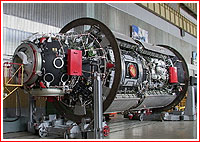
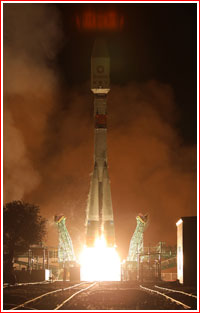
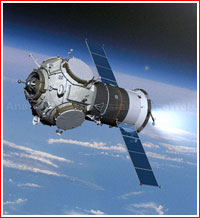
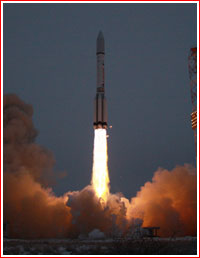
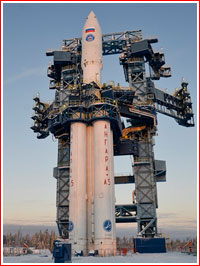
|